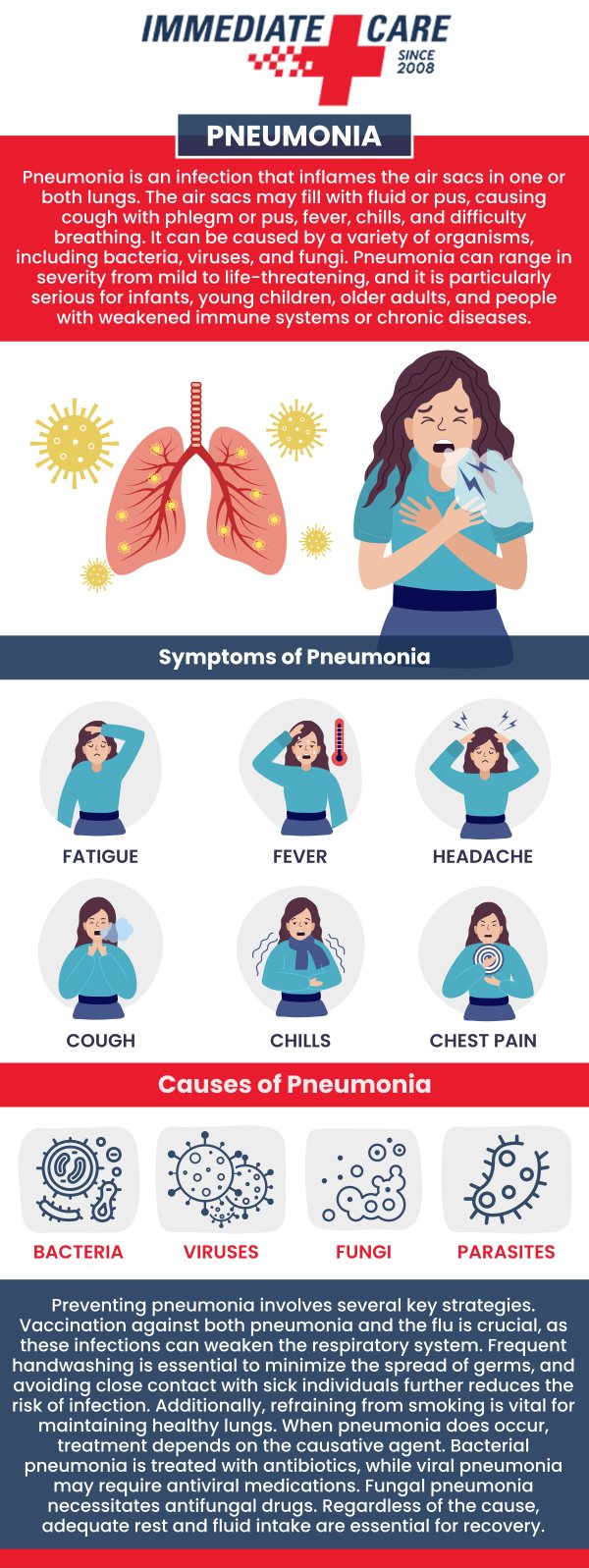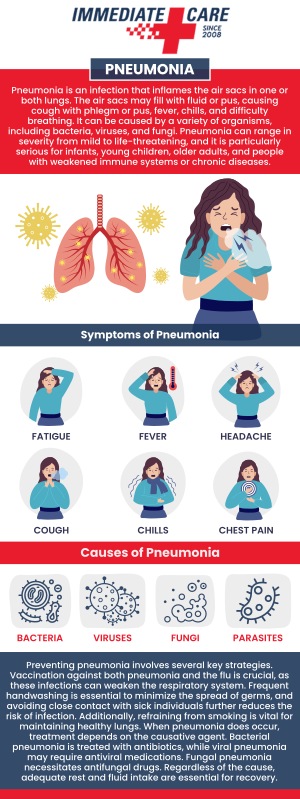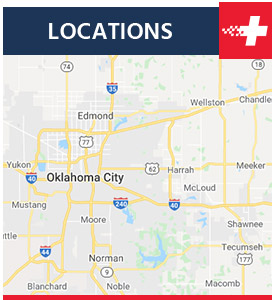Pneumonia Specialist Questions and Answers
At Immediate Care of Oklahoma, our pneumonia specialists would be more than willing to provide you with expert pneumonia evaluation and treatment! For more information, call us! We serve patients from Edmond OK, Norman(24th) OK, Norman(HealthPlex) OK, West Moore OK, I-240 & Sooner Rd OK, Yukon OK, Valley Brook OK, and Bethany OK.




Table of Contents:
What tests are done for pneumonia?
What are the 4 stages of pneumonia?
How long does it take for lungs to heal after pneumonia?
Can pneumonia damage the heart?
There are several different tests that your doctor may recommend to test for pneumonia, depending on what they are hoping to find. These tests include the following:
Blood test: After drawing a small amount of blood from your arm, blood tests can confirm a pneumonia infection and determine what organism has caused the condition, although precise identification cannot be guaranteed.
Chest x-ray: Chest X-rays help diagnose pneumonia while also determining the location and extent of the infection. However, they cannot identify the organism causing the infection
CT scan: In situations where pneumonia is not getting better when it should, a CT scan may be recommended so that your doctor can examine your lungs in greater detail.
Pleural fluid culture: A needle is placed in between the ribs that protect the pleural space of your lungs to extract a fluid sample, which is then analyzed to determine the type of infection, whether it is bacterial, fungal, or viral.
Pulse oximetry: A pulse oximeter is non-invasively attached to your finger, toes, or earlobe to measure the amount of oxygen in your blood. When oxygen saturation is below 94%, it could indicate a pneumonia infection.
Sputum test: After a deep, productive cough, a fluid sample is taken from the mucus and analyzed to determine the germ or organism that has caused the infection.
Congestion: Within the first 24 hours of infection, pus begins to accumulate in the alveolar sacs in your lungs due to an anti-inflammatory immune response, causing congestion in the lungs. Appetite loss, chest heaviness, coughing, fatigue, and rapid breathing are common symptoms that occur in this stage.
Red hepatization: After two to three days have passed since the first stage, your body begins to fight the infection by sending immune and red blood cells into the fluid-filled alveolar sacs. The red blood cells give the lungs a deep red appearance that resembles the liver. Common symptoms in this stage are chills, extreme fatigue, fever, headache, muscle aches, shortness of breath, weakness, and a wet cough. If you notice that you or your loved one has developed blue lips or fingernails, call 911 or go to the emergency room immediately.
Grey hepatization: Approximately two to three days after the second stage, the red blood cells begin to disintegrate in your legs, turning the red tinge to a greyish color. Immune cells remain during this stage, and symptoms are likely to persist.
Resolution: Your immune cells are finally beginning to rid your body of the infection, and you are on the road to recovery. That said, you may still experience fatigue or a productive cough until you have completely recovered.
The good news is that most people’s lungs completely heal after suffering a bout of pneumonia. However, the time it takes for individuals with pneumonia to breathe easy again varies from person to person. As such, it could take anywhere from one to six weeks until your lungs function with more ease and up to six months before you are completely free from the effects of pneumonia.
Severe cases of bacterial pneumonia can elevate a person’s risk of cardiac arrest, heart failure, and other heart conditions. Scientists have discovered that, in addition to the stress pneumonia places on the heart muscles, the bacterium known as Streptococcus pneumonia associated with most bacterial pneumonia cases can invade the heart and kill heart muscle cells. Consequently, if you are noticing pneumonia symptoms, it is highly recommended that you seek medical attention quickly to get on top of the infection before it progresses into a severe case of pneumonia.
For exceptional pneumonia treatment, our board-certified doctors and pneumonia specialists at Immediate Care of Oklahoma can get the job done with skill and expertise! We welcome you to come to one of our locations for a walk-in appointment if you are concerned about pneumonia.


Additional Services You May Need
▸ Urgent Care Services
▸ Illness + Injuries
▸ On Site Lab + X-Ray
▸ Helpful Health
▸ Motor Vehicle Accidents
▸ Drug Testing
▸ MRO
▸ UTI Treatment
▸ Employment Physicals
▸ Workers Comp
▸ Strep Throat Treatment
▸ Pregnancy Testing
▸ Blood Pressure Testing
▸ Urinalysis
▸ Mononucleosis Treatment
▸ Suture Removal
▸ Respiratory Syncytial Virus
▸ OccMed








